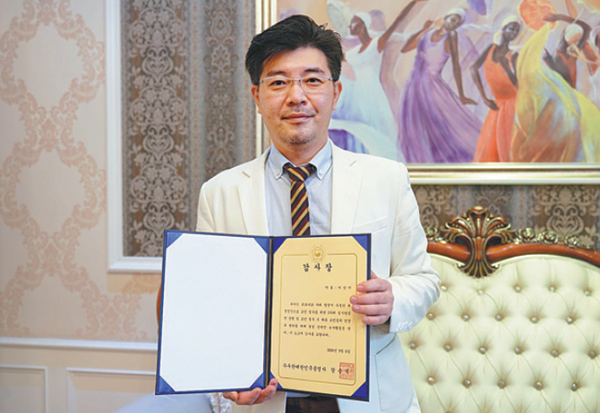

Lee Sang-qi displays an honorary certificate given by the South Korean government. [Photo provided to China Daily]
Surgeon stayed on during pandemic to calm and treat his compatriots
Among those who were keen to extend their thanks to Lee Sang-qi for his humanitarian efforts during the novel coronavirus pandemic was South Korea's President Moon Jae-in.
On July 24, Lee and other Koreans living in Wuhan, Hubei province, talked with Moon on the internet when the president thanked Lee for helping his compatriots during the city lockdown from Jan 23 to April 8.
Lee, a doctor, kept hundreds of his fellow citizens company and remotely provided them with medical advice and psychological counseling.
"I planned to go back to South Korea during the Lunar New Year holiday to visit my 75-year-old mother," Lee said. "Then the city was locked down because of COVID-19."
Lee could have returned to South Korea on one of the evacuation flights organized by the South Korean consulate in Wuhan, but he waived the chance.
"As far as I know, I am the only doctor among Koreans in Wuhan, and I felt that by staying here I could provide them with a sense of security and necessary medical help, so I chose to stay," he said.
Lee said as people had to stay at home he wrote prescriptions based on symptoms they described over the phone.
Because of a shortage of medical supplies, medicines were provided by the consulate in Wuhan and the Ministry of Foreign Affairs. The consulate arranged for the medicines to be delivered to Koreans who suspected they were ill.
"I vividly remember in February a 60-year-old grandfather had symptoms very similar to COVID-19, including a headache, fever and sore throat. I asked him to keep records of his temperature and blood pressure every day. I even prepared a protective suit just in case his situation deteriorated. Fortunately, he got better in a week," he said.
Lee said thanks to the efforts of the consulate, there were no confirmed COVID-19 cases among Koreans in Wuhan.
The 50-year-old plastic surgeon came to China in 2014 and moved from Guangzhou, Guangdong province, to Wuhan one year later where he has lived ever since.
Personal survival
Lee said he's not good at cooking and depended heavily on delivery services during the lockdown.
"Fortunately a fried chicken restaurant nearby kept running. Fried chicken with beer is very popular in Korea, so eating that really made me feel at home," he said.
Besides treating patients, Lee practiced the guitar and learned new musical pieces with the help of the internet. "I'm a positive person so as long as I was a captive of COVID-19 I was keen to spend every day doing interesting things," he said.
Lee said the two months left a deep impression on him.
"I was amazed how the Chinese government and the people handled this whole thing," he said. "Everybody did what the authorities required them to do, and that is worthy of respect. They say Wuhan is a heroic city, and that is something I completely agree with."
His efforts to help his compatriots gained a great deal of attention in his homeland after being reported by major TV stations.
As a result, someone left a message in Korean on his professional website saying: "Sorry, I'm not inquiring about plastic surgery. It's just that I was moved by what you have done and want to send you some Korean food because my sister lives in Shandong province. If that is appropriate can you send me an address?"
With life returning to normal as before the days of COVID-19 in Wuhan, Lee is back at work and a familiar routine. "I like Wuhan and China," he said. "It feels great being here."